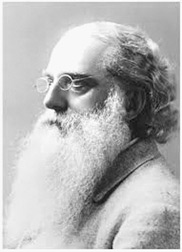Col. Henry Steel Olcott, the pioneer of Buddhist education
My Premasara Epasinghe
Sri Lankan Buddhists are ever grateful and indebted to Col. Henry
Steel Olcott, the silver-haired and bearded great American, who was
instrumental in introducing Buddhism to the English educated in Sri
Lanka. This thesophist is second only to Arahat Mahinda, who founded
Buddhism, during the reign of King Devanampiyatissa in the Anuradhapura
period.
|

Col. Henry Steel Olcott |
This remarkable personality, who was born 182 years ago at Orange,
New Jersey close to New York on August 2, 1832, initiated the
establishment of Buddhist schools such as Mahinda, Dharmaraja, Ananda
and its off-shoot Nalanda. In those difficult years these schools
groomed students, who later became eminent citizens of the country.
The training of children and the young ones designed to endow them
with knowledge, developing their skills, and abilities, improving mental
and physical character could be considered the main task of education.
Imparting knowledge, skills and attitudes forms the philosophy of
education. The creative and productive education leads people from
unreal to real. Also, it leads them from darkness to light. If there is
light in the soul, there will be beauty in a person. Then, there is
harmony at home, discipline and order in the nation. To achieve these
education plays a vital role. This was certainly the great mission of
Colonel Henry Steel Olcott.
Olcott was an expert in agriculture. As a young man, he worked at a
model farm in New York, U.S. and within a short period, he became an
authority on agriculture. The University of Athens, Greece, offered
Olcott, the prestigious post of the Dean of the Faculty of Agriculture,
while he declined. He established Westchester College of Agriculture in
Mount Vernon State, New York. Today, this institution is known as the
headquarters of the modern national agricultural system in the US. Col.
Olcott did many research and he published valuable books on agriculture
such as Sugarcane Cultivation and “Sorghum Cultivation”.
When the American Civil War broke out, he joined the army and served
in the battlefront of North Carolina. Later, he became a lawyer. He gave
up his lucrative practice and established the Theosophical Society on
November 17, 1895 in New York. The motto was “Truth is the highest of
all religions.”
Col Olcott was a born Christian. He married a daughter of a Christian
priest. Later, he renounced Christianity and embraced Buddhism.
What made him a Buddhist?
The historic religious debate between the Christians and the
Buddhists known as “Panaduravadaya” (Debate of Panadura) was given wide
publicity in America through the Ceylon Times, edited by John Capper.
Colonel Olcott after reading the interesting reports of the debate
decided to come to Sri Lanka and to learn more about Buddhism. This
directly helped the revival of Buddhist education in Sri Lanka.
With the arrival of Colonel Olcott in Ceylon, the Renaissance of
Buddhism bagan. On May 17, 1880, he and Helena Patrouna Blavatsky
arrived at the Galle Harbour. They embraced Buddhism on May 25, 1880
before Ven. Akmeemana Dhamarama Thera at Vijayananda Pirivena, Galle.
Soon, Colonel Olcott, became the messiah of Buddhism. Fortunately,
there were great Buddhist personalities such as Ven. Hikkaduwe Sri
Sumangala Thera and Anagarika Dharmapala.
With the advent of Buddhism in Sri Lanka, the Pirivena education
flourished. But, with the invasion of Portuguese, Dutch and British,
Buddhist education took a nose-dive. According to the educational
statistics, at the time of Olcott's arrival in Ceylon, there were only
two Buddhist schools at Dodanduwa and Panadura.
It was revaled in 1834 that school administration was handled by a
commission chaired by a Bishop.
Year No. of Schools
In 1870 – 156
In 1872 – 200
In 1900 – 1328
Out of them, there were 1,117 Christian schools. There were only 132
Buddhist schools and 68 Hindu and private schools.
Religious – wise student popular was:
Buddhists – 2,141,404
Hindu – 2,26,826
Christians – 3,49,239
Muslims – 246,118
Others – 2,367
This clearly shows where the Buddhist education was heading for at
that time. Colonel Olcott was responsible in establishing 142 Buddhist
schools between 1880-1900.
Educationist, Colonel Henry Steel Olcott's contribution to the
Buddhist education is outstanding. His name will be etched in gold in
the annals of Sri Lanka's history as one who pioneered Buddhist
education. |

